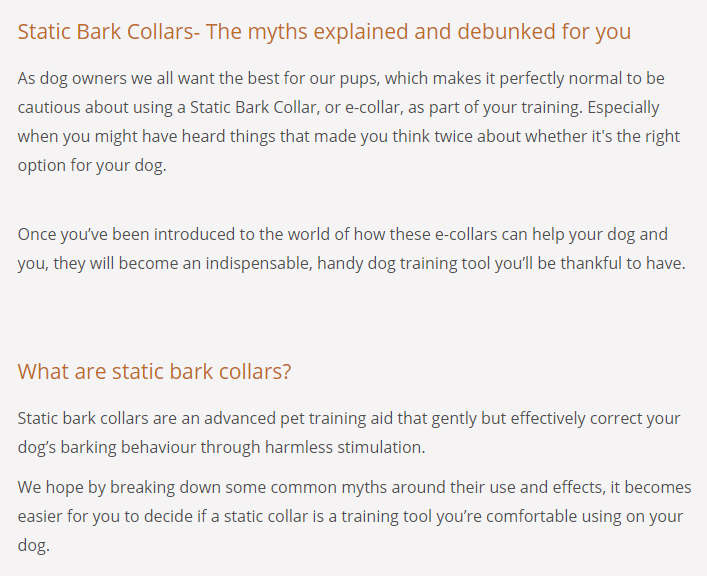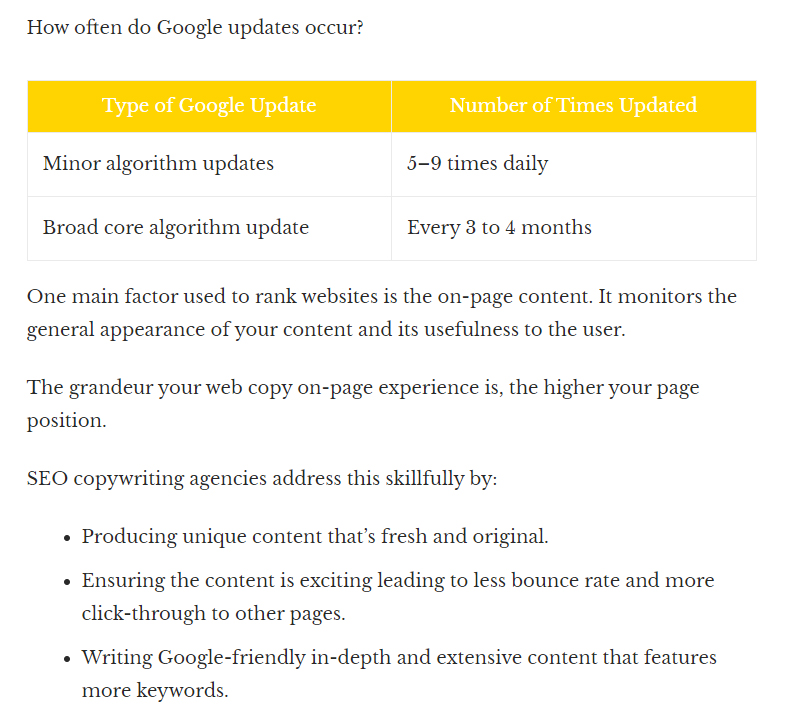After years of blogging and testing digital marketing strategies, Sinick concludes:
“There are tons of different factors that go into ranking well, but the biggest is high-quality content.”
David Sinick
Besides ranking high on Google, high-quality blog content brings in more traffic, potential long-term readers, and conveys the story of your brand in a consistent voice.
How do you achieve this on your store’s blog and what’s the secret to crafting and regularly publishing high-quality content?
Successful blogs keep quality by making sure:
- Readers learn from their informative content
- Posts are easy to read and skim for information
- Topics are written from their unique point of view
- Blog content is written for readers instead of for search engines
Tip 1: Bring Insanely Good Value to Your Reader
Most readers will find your company’s blog while looking for answers to their product-related questions. Others are seeking products and want to make sure they’re making an informed purchase.
To inform both current and potential customers, publish different types of articles on your blog.
The table below explores how to bring value to your reader with the three most common types of articles for store’s blog:
| Blog Article Type | How It Provides Value | Headline Examples |
| How-to Guides |
|
|
| Listicles |
|
|
| Case Studies |
|
Tip 2: Make Information Effortless to Find
Readers are looking for specific information and want to find it quickly. Whether it’s written in-house or outsourced, online readers want to read well-written and organised blog content.
Well-written blog posts:
- Use both long and short sentences to create rhythm
- Use simple terms readers from all walks of life can understand
- Are error-free
Your content also needs to be neatly organised, or skimmable. To achieve this, elaborate on the topic within a couple of subheadings that further explain different parts of the content issue in depth.
Some additional ways you can organise an article are by:
- Providing the writing with other media that breaks down long slabs of text—such as images or YouTube videos
- Adding lists and tables to emphasise the most important data
- Highlighting key concepts in bold to draw attention to them
As readers skim the article, they’ll stop at parts that stand out. Those parts can be tables, lists, images or videos. Use them to draw attention to the key information in the article.
This is a snippet from a blog post that uses both a table and a list. Notice how they make the article easier to skim:
Tip 3: Write Blog Content No One Else Can
You don’t have to reinvent the wheel with your blog content, but you can contribute with your experience and expertise. Put your own spin on familiar topics to offer something new.
People are more likely to click on your article and read it thoroughly if it’s written from an interesting perspective—even if they’re familiar with the topic.
Offer a new way of seeing the world through the lens of your industry by:
- Highlighting the unique story behind your products and brand
- Elaborating on what you do differently from competitors
- Covering lesser-known topics about your industry from an expert’s point of view
- Dispelling any myths people might have about your products—have prototypes been dangerous in the past or do people misuse them?
- Presenting new studies that reveal something novel about the way your industry works
For example, this is an excerpt from an article on an eCommerce blog that addresses a myth about their product:

Tip 4: Focus On People, Not Just SEO
We’re often hyper-focused on SEO and optimising content to rank well. However, people are the ones who share, read, and comment on your blogs—they engage with your content.
Take it from one of the most successful bloggers today:
“Don’t focus on having a great blog. Focus on producing a blog that’s great for your readers.”
Brian Clark
To produce reader-centred blogs:
- Find out what your audience wants to read—ask them, note what kind of written content on your blog gets the most attention
- Share blog posts that help readers connect to your brand—share your authentic story
- Publish articles that are well written and well researched—readers will notice spelling errors and non-factual claims. These things will both make you look unprofessional and untrustworthy
- Write organic content that isn’t stuffed with keywords but covers a topic in-depth instead
Keep it in mind that your readers have been on the internet for most of their lives—some don’t know the world without it.
They know what kind of content they want and can spot if content has just been churned out.
They even have a specific way of reading the content
They skim and read blogs and articles every day and can recognise if you’re just copying trending topics from other sites. They’ll even pick up on awkward sentences that have been stuffed with keywords to make SEO happy.
They’ve seen it all—even the articles that have been written by AI:

Write for your human audience because they’re the ones supporting you and looking for the content you’re publishing.
High-Quality Content Takes a Lot of Time and Dedication
A successful blog is synonymous with high quality because it takes a lot of time to plan, learn from what worked in the past, and have the patience to upload quality content regularly.
Successful blogs are the result of good research, a consistent voice, and new perspectives.
Here at CopySmiths, we understand how much work goes into creating blog posts. We have a dedicated team of writers and editors who can help you with this commonly outsourced task.
Contact us now to discuss a strategy for your blog.
Frequently Asked Questions
What Makes Good Content?
Good content offers value to readers, helps them understand the key elements of your business, and provides solutions to their pain points.
How Do I Check My Content Quality?
To ensure you’ve received a high-quality blog, check it with tools that:
- Detect plagiarism—such as Dupli Checker
- Catch grammar and spelling mistakes—such as Grammarly/ProWritingAid
- Highlight writing that is too complex and hard to read—such as Hemingway
How Do Blogs Promote eCommerce?
Blogs offer a space for promoting your products and services. They highlight all the ways your customers can benefit from them and what they should know in order to make informed purchases.

